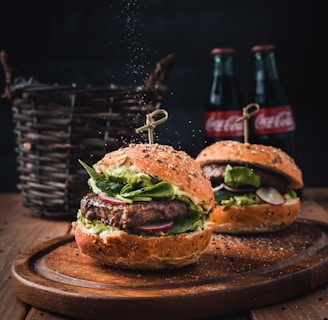Stress Eating Sabotaging Your Heart Health? Here's Why"
Feeling stressed and reaching for comfort food? It might be hurting your heart more than you think. Learn how unhealthy choices during stressful times can delay blood vessel recovery and increase cardiovascular risk.
DR ANITA JAMWAL MS
6/13/20244 min read


Feeling stressed and reaching for unhealthy comfort food? This study published in Frontiers in Nutrition suggests it might harm your blood vessels. Young adults consumed high-fat or low-fat meals before a stressful task. Both meals caused temporary harm to blood vessel function, but the high-fat meal delayed recovery. This means it took longer for blood vessels to return to normal after stress. While more research is needed, this highlights the potential downsides of unhealthy choices during stressful times. Opt for healthier options like fruits and vegetables, and consider alternative stress relievers like exercise or meditation.
Key points:
Stress is widespread and linked to poor health, including an increased risk of cardiovascular disease (CVD).
Stress causes changes in the body, including increased heart rate, blood pressure, and potentially impaired vascular function.
People often resort to unhealthy eating, like high-fat foods, during stress, which can independently harm blood vessel health.
This study investigated whether a high-fat meal before mental stress further worsens the negative effects on vascular function.
Methods:
21 healthy adults participated in a randomized crossover study.
They received either a high-fat or low-fat meal 1.5 hours before an 8-minute mental stress task.
Blood flow, blood pressure, and endothelial function were measured before and after the meal, both at rest and during stress.
Results:
The high-fat meal increased blood fats as expected.
Both high-fat and low-fat meals led to similar increases in blood flow, blood pressure, and heart activity during stress.
Both meals caused a temporary decline in endothelial function 30 minutes after stress.
However, only the high-fat meal group had impaired endothelial function even 90 minutes after stress, suggesting slower recovery.
Discussion:
Since many people eat unhealthy foods during stress, these findings highlight the potential harm they can have on blood vessel health.
High-fat meals seem to prolong the negative effects of stress on endothelial function, which could increase CVD risk.
This emphasizes the importance of choosing healthier food options, especially during stressful periods.
Additional Notes:
Consuming high-fat foods before mental stress reduces vascular function by 1.74%.
This impairment persists longer than when low-fat food is consumed.
High-fat food also decreases cerebral oxygenation in the pre-frontal cortex (39% reduction).
Fat consumption negatively impacts mood during and after stress.
Eating low-fat food reduces the negative effects of stress on vascular function.
Consuming polyphenol-rich foods (cocoa, berries, etc.) prevents impairment in vascular function during stress
In the realm of health and wellness, understanding the intricate relationship between diet, stress, and vascular health is paramount. Recent research has shed light on the impact of high-fat meals on our physiological response to stress and, subsequently, on vascular function. This article delves into the main findings and potential mechanisms elucidated by these studies, offering insights into the implications for cardiovascular health and actionable recommendations for mitigating risk.
Main Findings
The primary findings of recent research suggest that consuming a high-fat meal before experiencing mental stress can significantly delay the recovery of endothelial function compared to a low-fat meal. This delay amounts to approximately 90 minutes, indicating a prolonged negative effect of high-fat meals on blood vessel health in young, healthy adults.
Both high-fat and low-fat meals induce temporary declines in flow-mediated dilatation (FMD), a measure of endothelial function, 30 minutes after stress. However, there were no significant changes observed in peripheral vasodilation or cardiovascular responses during stress.
Potential Mechanisms
The observed effects may be attributed to increased blood fats (such as TAG and CRP) following high-fat intake, which could directly damage the vascular wall or induce dysfunction through oxidative stress or inflammation. These mechanisms align with the peak rise in TAG levels after fat consumption, suggesting a plausible pathway for the observed delays in endothelial function recovery.
Limitations and Future Directions
While the findings provide valuable insights, it's essential to acknowledge the limitations of the studies. These include the use of a moderate sample size and participants with healthier dietary habits than the general population. Future research should aim to replicate these findings in broader populations, particularly those at higher risk of cardiovascular disease, to confirm their validity and applicability.
Implications for Cardiovascular Health
The implications of these findings are profound, especially for individuals in high-stress professions or those at risk of cardiovascular disease. The observed impairments in vascular function following high-fat meal consumption underscore the importance of dietary choices in mitigating stress-induced cardiovascular risks.
Recommendations for Mitigation
Choosing low-fat options, particularly during periods of heightened stress, may help protect blood vessel health and reduce the risk of cardiovascular disease. Additionally, incorporating healthier foods rich in polyphenols—such as cocoa, berries, grapes, apples, and other fruits and vegetables—can offer protective benefits against stress-induced vascular dysfunction.
Conclusion
In conclusion, the interplay between diet, stress, and vascular health unveils critical insights into preventive strategies for cardiovascular disease. By making informed dietary choices and adopting healthier coping mechanisms, individuals can safeguard their vascular function and mitigate the adverse effects of stress on cardiovascular health.
Reference Article
Baynham, R., Weaver, S. R., Rendeiro, C., & Van Zanten, J. J. C. S. V. (2023, November 9). Fat intake impairs the recovery of endothelial function following mental stress in young healthy adults. Frontiers in Nutrition. https://doi.org/10.3389/fnut.2023.1275708
Related
https://healthnewstrend.com/eat-diverse-protein-lower-blood-pressure-risk-new-study-findings
https://healthnewstrend.com/understanding-the-metabolic-symphony-how-exercise-impacts-your-body
Medical Disclaimer
The information on this website is for informational purposes only and is not intended to be a substitute for professional medical advice, diagnosis, or treatment. Always seek the advice of your physician or other qualified health care provider with any questions you may have regarding a medical condition or treatment. Never disregard professional medical advice or delay in seeking it because of something you have read on this website.
